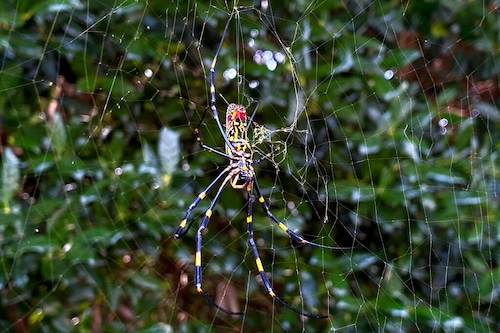A different kind of mosquito, a jumping spider and new diseases could be coming to Massachusetts due to climate change, an expert warns.
Globally, temperatures have been rising, a product of global greenhouse gas emissions from human activities. It’s expected to result in continued warming and “other large-scale changes, including rising sea levels, melting ice, ocean warming and acidification, changing rainfall patterns and shifts in timing of seasonal events,” a report called the Fifth National Climate Assessment said.
This could mean less snow in New England, according to the report. But a Massachusetts expert warns of other dangers.
Different types of “vector-borne diseases,” often carried by mosquitos and ticks, are changing where they are geographically, meaning it could come to Massachusetts for the first time, Gregg Furie, director of sustainability at Brigham and Women’s Hospital, told MassLive.
“And so one question is, as the climate warms, does the local environment here become capable of supporting populations of the insects that carry these diseases? And will we kind of ultimately be at risk of being exposed to those,” he said.
One of those diseases is dengue, which is carried by mosquitoes.
What is dengue?
Someone with dengue might experience a fever with aches and pains, including pain behind the eyes, nausea and vomiting, according to the Centers for Disease Control and Prevention. About 5% of dengue cases can be severe, resulting in shock, internal bleeding and death. Symptoms include belly pain or tenderness, vomiting (at least three times in 24 hours), bleeding from the nose or gums, vomiting blood, or blood in the stool, and feeling extremely tired or restless, the CDC warns.
This summer, the Mosquito Control District will begin surveilling, capturing and sampling mosquitoes to see what species are in the region, and then test the level of disease, Jeanne Galloway, West Springfield’s director of public health and chair of the commissioners for the Pioneer Valley Mosquito Control District, told The Republican.

The joro spider, a large spider native to East Asia, is seen in Johns Creek, Ga., on Sunday, Oct. 24, 2021. The spider has spun its thick, golden web on power lines, porches and vegetable patches all over north Georgia this year – a proliferation that has driven some unnerved homeowners indoors and prompted a flood of anxious social media posts. (AP Photo/Alex Sanz)AP
What are Joro spiders?
Joro spiders, known for their ability to appear as if they’re flying, are headed to the Northeast.
In the Northeast, Joro spiders have been found no further north than Maryland. Although none have been seen in Massachusetts, there are some concerns about them spreading to here.
José R. Ramírez-Garofalo, an ecologist at Rutgers University’s Lockwood Lab, told SILive that “it is a matter of when, (and) not if” the spiders land in New York and New Jersey.
Similarly, David Coyle, invasive species expert at the University of Clemson, states the spiders will expand to the eastern U.S.
“Those data show that this spider is going to be able to inhabit most of the eastern U.S.,” Coyle said. “It shows that their comfort area in their native range matches up very well with much of North America.”
Georgia was the epicenter of their concentration in the U.S. starting in 2021, the pest control company stated. However, they are originally from Japan.
Previously their downfall in Massachusetts was cold winters.
Officials told MassLive it is unclear if the Joro spiders can survive Massachusetts winters and overall tolerance to cold temperatures.
However, with Massachusetts winters getting warmer, there’s a chance that could change things for the spiders.
These are the types of things Furie warns people about.
“If we are complacent, and are not paying attention to these possibilities, and considering the potential risks in the future, then we risk potentially not being able to respond adequately should these threats actually turn out to be real,” he said.
What can people do?
Furie said there’s both individual and systemic action that needs to be taken to prevent this from continuing.
For people, it’s important to be mindful of the types of transportation their taking, eat less meat, particularly beef, purchase renewable energy and vote for candidates who push for aggressive policy at the local state and federal level on climate change, he said.
In the end, it’s unclear what the future will hold. These kinds of things can be difficult to foresee, as he said climate impacts on human health is “often very unpredictable.”
Last year, it was the impacts of the wildfire smoke in Massachusetts. Next year, it could be new bugs and spiders in the area.
“[Wildfire smoke is] not an impact that we typically think about in Massachusetts. Yet, it was clearly present and definitely related to climate change,” he said. “And so I think there’s an unpredictability to this. And what’s most important is that we are in a position to be adaptable, and prepared to address these new threats and changing threats over time.”






